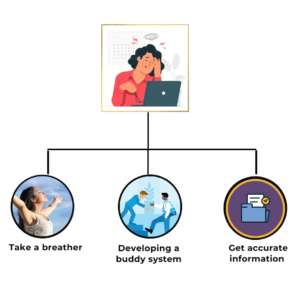These years have been stressful for everyone, especially for the front-line warriors. The virus outbreak left doctors across the country battling hard in their personal and professional lives, further leading to burnouts or secondary traumatic stress situations.
Easing stress at its initial stage is the only way to avoid further extreme consequences.
Here are 3 daily habits that can help you deal with stress.
Take a breather:
You have heard it before: Stop, take a breath and calm down. Deep breathing (Alom -Vilom) has been a calming technique now for ages. One of the easy ways to reduce stress is deep breathing and letting it out slowly; repeat it throughout the day.
Alternatively, try mindfulness. Mindfulness is a type of meditation in which you focus on being intensely aware of what you are sensing and feeling in the moment without judging. Mindfulness is considered and supported as an adjuvant therapeutic intervention and could help physicians manage job stress and burnout.
You can practice Mindfulness by: Stop what you are doing and take a deep breath. Take a moment to notice the sensation of your breath and secondly put down your phone. Do one thing at a time. Find pleasure in everyday tasks. Develop an attitude that is non-judgmental but curious, and kind.
At the end of the day, we are all human beings, and each one of us responds to stress differently. But what is important is to maintain your own emotional health while doing your job. Create a work life balance. Find out what helps you to relax and include that in your routine. It could be music, book reading, playing a game gardening, watering plants, spending time with family, community service, yoga, meditation, sit in silence for few minutes, short relaxation exercises and for that matter it can be anything which gives you happiness. Find what works the best for you.
Developing a buddy system:
Helping others is beneficial and makes distressful circumstances easier to bear. Give and get support from your colleagues. Developing a buddy system which can help you and your colleagues to cope with unwanted stress. Partner together to support each other. Share thoughts and workload. Set time to check wellbeing of with each other and all acquaintances, listen, and share your feelings and experiences. Acknowledge tough situations and recognize accomplishments, even small ones. This will encourage each one of you to face any situation together, which will ultimately help relieve stress.
Accurate Information:
Get accurate information but not too much information. The news changes minute by minute, and healthcare workers need to stay well informed as it helps reduce the fear of the unknown. Make sure that you stick to trusted sources of information. Avoid TV channels which are in unorganized sector and avoid online hype created by unorganized individual channels on social media. Ensure that the information you receive is factual and comes from valid and trusted source.
Just do not overdo it, or you can easily become overwhelmed by the avalanche of news and information constantly flowing in. The rapidly changing nature of the news can be draining and upsetting, so it is important to set some boundaries on the amount of information you take in. Avoid negative, depressing and crime news particularly in the morning. This can help you reduce stress and increase a more balanced response to the situation. Also, taking breaks can alleviate your mind for a while.

